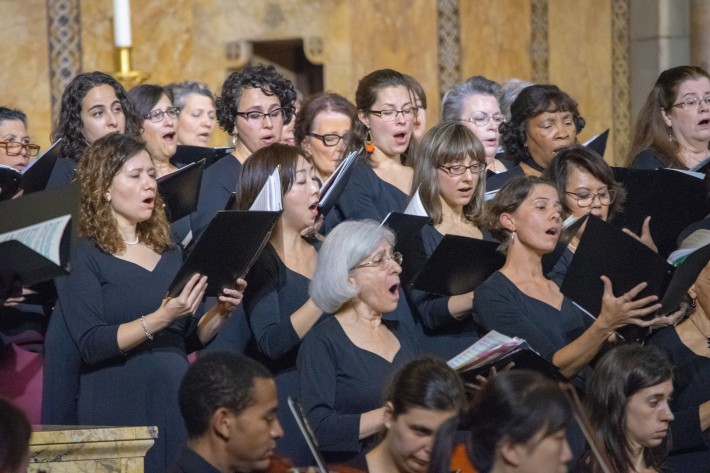Join us this Thursday (August 3rd) 3pm EDT (9pm CET) for a special No2Nato Humanity for Peace rally featuring just some guest speakers from across the globe who will be speaking at the Sunday 6 Aug rallies across the globe commemorating the anniversary of the nuclear bombing of Hiroshima. Unite with us demanding it to never happen again!
The Schiller Institute would like to extend our condolences to the family, friends snd associates of former United States Attorney General Ramsey Clark, who passed away at the age of 93 on Friday, April 9. Clark stood for the true Constitution of the real United States, and was consistently opposed to the hijacking of the American legal system for the purpose of justifying war crimes—often committed in the Constitution’s name. He was, moreover, a voice for reason that, contrary to many others of his, and later generations, became clearer and stronger as the decades passed.
Clark, who never missed an occasion in the last years of his life to appear at Schiller Institute events when called upon to do so, was, like LaRouche, an independent man of principle, a true citizen of “the republic of the Mind.” So long as he was alive, the justice that citizens should expect to enjoy from the American Constitutional and legal system was personified. Clark understood the true depth of injustice that LaRouche and his associates had suffered, and he also appreciated that “the book people,” as he referred to LaRouche’s International Caucus of Labor Committees, possessed an unshakeable commitment to truth.
One source recalled in recent days that Clark caused those who were severely critical of LaRouche, particularly on the left, to investigate who LaRouche really was. His assessment was said to be that the ICLC, Schiller Institute and affiliate organizations were the best organized group against the establishment, and that, if LaRouche and his co-thinkers and organizations were to disintegrate or be destroyed, the United States would turn to fascism.
It was to prevent precisely such an occurrence that Clark sent a letter to Attorney General Janet Reno in 1995, which began as follows:
April 26, 1995
Re: U.S. v. Lyndon LaRouche, Jr. et al.
Dear Attorney General Reno,
I have been an attorney in this case since shortly after the defendants were sentenced in January 1990 and appeared as co- counsel on appeal and on the subsequent motions and appeals in proceedings under 28 U.S. C. sec. 2255 and F.R. Cr.P. Rule 33. I bring this matter to you directly, because I believe it involves a broader range of deliberate and systematic misconduct and abuse of power over a longer period of time in an effort to destroy a political movement and leader, than any other federal prosecution in my time or to my knowledge. Three courts have now condemned the Department’s conduct in this prosecutorial campaign. The result has been a tragic miscarriage of justice which at this time can only be corrected by an objective review and courageous action by the Department of Justice.
Clark’s depth of character, and deeper understanding of the problem of the post-war American outlook, was referenced by him in this statement, recorded in a documentary about him called Citizen Clark:
“There are sayings around the Kennedy Center, carved above the marble above the colonnades when you walk in. And on the backside toward the Potomac, there’s one; it’s a quote from President Kennedy that says: ‘I look forward to the day when America is no longer afraid of grace and beauty.’ And I thought immediately when he was shot, that that’s why he was shot. We are afraid of grace and beauty.”
April 25 (EIRNS) – The Schiller Institute NYC Chorus & with friends from Ibero-America and Europe broadcast an uplifting concert this afternoon, which was introduced as follows by Jen Pearl:
Good afternoon, and welcome to `Beethoven’s Credo: Believe in the Future, a World Without War.’ My name is Jen Pearl and I am the chair of the board for the Schiller NYC chorus.
On December 17th, 2019, Beethoven’s 249th birthday, our chorus, the SI NYC Chorus participated in an event at Carnegie of the Foundation for the Revival of Classical Culture, opening up what was supposed to be a year-long celebration of the Beethoven 250th year. We performed the choral movement of the Ninth Symphony there, with the preeminent Gerard Schwarz as conductor. We took as our objective to perform Beethoven’s great Missa Solemnis a year later.
Then we all know what happened. While many choruses and arts organizations were forced to pull back during the lockdown, the Schiller Institute NYC Chorus pushed ahead, despite the challenges, because we know how important it is to sing beautiful and profound music in times of crisis—music, which connects us at the higher level of humanity as a single immortal species. We managed to present virtual performances of the Kyrie and Gloria last December.
Today’s concert is truly special because it features another movement the Missa Solemnis.
And while we are excited and joyful about bringing you the Credo movement of the Missa Solemnis and other beautiful selections tonight, we are also performing this concert in the context of a world fraught with crises, including an increasing potential of world war and starvation in Yemen and Syria. The beauty of tonight’s program, which reflects the very best of mankind’s creativity, is also very much in direct contrast or dissonance with the very worst actions being done at the hand of human beings, right now as we speak, toward entire nations and populations of children.
Beethoven once said that, if people understood his music, there would be no war.
On this day, April 25th, 76 years ago there was an event that resonates powerfully still today with that sentiment, that mankind should not settle disputes with violence. This was the day during WW II that American and Soviet troops met from the east and the west at the Elbe River near Torgau Germany, south of Berlin, ensuring an early end of the war, and thus became known as `Spirit of the Elbe.’ We dedicate this concert to that spirit which is much needed today. So we will begin our concert today with this short video introduction.
Near the end of the concert, Jen Pearl made the following closing remarks:
Our final offering this evening is Mozart’s Ave Verum Corpus. Mozart composed this motet in a perfect way to evoke from you the awe you would experience when seeing the body of Christ for the first time. Imagine what your reaction would be then as you listen, think of how Mozart evokes that in you!. Mozart’s opening words are `hail, hail true body. . .’ As with any great classical work, the singer and you, the audience, can relive the experience of that actual moment in history and therefore experience true immortality.
We are now in a moment of history, where we need to evoke that quality of empathy and immortality in ourselves in order to take all of mankind into our hearts and souls. As we referenced at the beginning, we invite you to join the chorus of voices that are calling for an end to these wars, sanctions, and starvation, particularly in Yemen and Syria. You can find Mrs. LaRouche’s urgent call in today’s program and I invite you to join us. Thank you, and now you will hear Mozart’s Ave Verum Corpus.
Note the concert can be viewed at this link.
PANEL 1: “Hang Together, or Hang Separately”: Free and Sovereign Republics, or Digital Dictatorship?
(Saturday, Dec. 12, 2020, 9 a.m. EST)
Panel I speakers:
Moderator’s Welcoming Remarks
Helga Zepp-LaRouche, Schiller Institute President: Introduction
Marino Elsevyf (Dominican Republic), Attorney-at-Law, Member of the 1995 Martin Luther King International Tribunal: Report from the International Investigative Commission on Truth in Elections
David Meiswinkle (US), Attorney-at-Law; Report from the International Investigative Commission on Truth in Elections
Viktor Dedaj (France), citizen-journalist, “The Crucifixion of Julian Assange: A Journalist Committed to Truth and Peace.”
Harley Schlanger (US), Board of Directors, Schiller Institute, Inc., “What Are the Principles and Facts Concerning the Recent US Election”
David Christie (US): ”The British Empire’s Digital Dictatorship: Censorship and Mass Social Control”
Q & A Session
PANEL II: Escaping the Danger of World War III: A Strategic Order Based on the Common Aims of Mankind
(Saturday, Dec. 12, 2020, 1:00 p.m. EST)
Panel II Speakers
Helga Zepp-LaRouche, Schiller Institute President
Yan Wang, PhD, “The Chinese Economic Model”
Marcelo Muñoz (Spain), Founder and President Emeritus, Cátedra China, “China and the US: Rivalry, Confrontation, or Cooperation”
Ole Doering, PhD (Germany), Sinologist and Philosopher: “A Salutogenic Symphony with Ancient Chinese Philosophy: Harmony as Polyphonic Accord and Peace as Expressive Equilibrium. Can We Make It Work?”
Prof. Emmanuel Dupuy (France), Founder and President, Institute of European Prospective and Security (IPSE): “What is at Stake in the on-going Renovation of Nuclear Doctrines and Ballistic Treaties: What Agenda for the European Countries in the Context of a Strategic Autonomy of Europe.”
Col. Richard H. Black (USA Ret.), former head of the Army’s Criminal Law Division of The Pentagon, former State Senator (Va.): “NATO Must Be Dissolved”
Q & A Session
Paul Gallagher, (US), Executive Intelligence Review, Editorial Board, “LaRouche’s New Bretton Woods and the Central Banks —
There’s Not Enough Room in this World for Both of Them”
Marc-Gabriel Draghi (France), Economist: “Orderly Debt Cancellation: Historical Precedents and Present Relevance.”
Q & A Session
PANEL III: Overcoming the World Health Crisis and the Hunger Pandemic: Thinking on the Level of the Coincidentia Oppositorum
(Sunday, Dec. 13, 2020, 9:00 a.m. EST)
PANEL IV: A Human Future for Youth: A Beethoven-Driven Renaissance of Classical Culture
(Sunday, Dec. 13, 2020, 1:00 p.m. EST)
The Schiller Institute held the first U.S. national conference in over fifteen years on President’s Day weekend, yielding a tremendous success in respects to the quality of presentations and the participation by supporters around the world attending the conference. The conference, now presented in full below, conveys a truthful and optimistic view of the potential for mankind as a whole to overcome the crisis facing the world as the previously reigning, now dying, British Empire fights for its survival against the new world order taking hold in the vision of Lyndon and Helga Zepp-LaRouche.
Panel I — Let Us Create a New, More Human Epoch for Mankind
Lyndon LaRouche Speaks: A Talent Well Spent
Jacques Cheminade, President of Solidarité & Progrès, The coming world of Lyndon LaRouche
John Gong, Professor of Economics at the University of International Business and Economics, Beijing, Chinese Investment and American Infrastructure under the new Sino-US relations
H.E. Ambassador Vassily A. Nebenzia, Ambassador and Permanent Representative of the Russian Federation to the United Nations, Presented by Counsellor Theodore Strzhizhovskiy, Mission of The Russian Federation to the UN, Prospects for East-West Collaboration: The Russian Federation’s View (transcript)
William Binney, Former Technical Director, NSA
Jason Ross, Schiller Institute co-author “Extending the New Silk Road to West Asia and Africa”, The Urgent Need for a New Paradigm in Africa
Dennis Small, EIR Ibero-America Editor, Justice for the World: Why Donald Trump Must Exonerate Lyndon LaRouche Now
Panel II — The Aesthetic Education of Man for the Beauty of the Mind and Soul
Schiller Institute combined chorus:
Benjamin Lylloff, arr: “Mo Li Hua” (“Jasmine Flower”)
Benjamin Lylloff, director
H.T. Burleigh, arr: “Deep River”
William L. Dawson, arr: “Ev’ry Time I Feel the Spirit”
Diane Sare, director
Megan Beets, LaRouchePAC Scientific Research Team, “Artistic and Moral Beauty“
Bruce Director, Secretary-Treasurer, US Schiller Institute
“On LaRouche’s concept of significance of Art for Science and Science for Art”
Diane Sare, Managing Director of the Schiller Institute NYC Chorus, “The Choral Principle”
Johannes Brahms: “Dem dunkeln Schoß der Heil’gen Erde”
(text from Schiller’s “Song of the Bell”)
Schiller Institute Chorus
John Sigerson, director
Johann Sebastian Bach: Brandenburg Concerto No. 5 in D Major, BWV 1050
I. Allegro
Schiller Institute Orchestra
John Sigerson, director
Soloists: Gregor Kitzis, violin; Laura Thompson, flute; My-Hoa Steger, piano
Ludwig van Beethoven: Choral Fantasia, Op. 80
Schiller Institute Orchestra, Chorus, and Soloists
John Sigerson, director
My-Hoa Steger, piano
Q&A Session
Panel III — The Frontiers of Science
Yuting Zhou, piano, Johannes Brahms: Rhapsody, Op. 79, No. 1 in B minor
Kesha Rogers, LaRouchePAC Policy Committee, Former candidate for U.S. Congress, The Frontier of Space: Fulfilling Mankind’s Destiny as Man in the Universe
Thomas Wysmuller, Founding member of The Right Climate Stuff, What NASA has Done and Where NASA is Going
Larry Bell, Founder, Sasakawa International Center for Space Architecture, College of Engineering, University of Houston, What Makes People Exceptional
Benjamin Deniston, LaRouchePAC Scientific Research Team, LaRouche’s Strategic Defense of Earth
Hal BH Cooper, Jr. PhD PE, Infrastructure needs for the Rail, Energy and Water Systems to Promote Future Economic Development of Africa
Message to the Schiller Institute national conference, Feb. 16, 2019 by H.E. Ambassador Vassily A. Nebenzia, Ambassador and Permanent Representative of the Russian Federation to the United Nations, presented by Counsellor Theodore Strzhizhovskiy: “Prospects for East-West Collaboration: The Russian Federation’s View”
[This transcription was created by the Schiller Institute]
DENNIS SPEED: Next we have a statement from His Excellency Ambassador Vassily A. Nebenzia, Ambassador and Permanent Representative of the Russian Federation to the United Nations. It will be presented by Counsellor Theodore Strzhizhovskiy of the Mission of the Russian Federation to the UN: “Prospects for East-West Collaboration: The Russian Federation’s View.”
THEODORE STRZHIZHOVSKIY: Ladies and Gents, it’s a real pleasure for me to be here, giving the tribute to the role which Russian-American relations plays in the modern world, and the contribution of the Schiller Institute to that relation, we prepared a statement which I will read now.
First of all, I welcome the organizers, participants and guests of this conference. The Schiller Institute is known for its valuable contribution to the understanding of international political processes, and development of new approaches to the global challenges. The conferences held under your auspices are respectful platforms, where the most urgent present-day issues can be discussed without politicizing and ideological clichés.
We were very saddened by the bitter news about the passing of Lyndon LaRouche, the founder and inspirer of the Schiller Institute. We would like to express our deepest condolences to Helga Zepp-LaRouche, as well as to the relatives and colleagues.
We are convinced that the paradigm of international, political, and economical intervention that he had proposed will be further developed by his apprentices and associates. [applause]
We believe that the assent of a more human epoch is only possible when the world enjoys a more equitable, polycentric model of governance. However, recently we have become witnesses of the attempts to shatter the world security architecture, substitute agreed universal norms by some rules-based order, where rules are invented, depending on the geopolitical interest to concrete countries. Nonetheless, dangerous for the global stability is the striving of the governments of some countries to unilaterally impose their will on the global community, or on specific sovereign states, or even to interfere in their domestic affairs. In the same light, we should view the use of sanctions as a tool to execute pressure and punish the countries that implement an independent policy.
Russia is proud to be located between West and East. Historically, we have been implementing multitask foreign policy and developing relations with other countries in the spirit of mutual respect. Russia comprehensively helps to search for, based on international law, collective decisions to the global problems which all the countries face today. We consecutively engage in the activities of the UN and Group of 20, to contribute to the relevant forms of interaction, for example, Collective Security Treaty Organization, Eurasian Economic Union, Commonwealth of Independent States, Shanghai Cooperation Organization, BRICS. One of the conceptual pillars of developing this sort of cooperation was proposed by President Putin in his initiative called, “Greater Eurasian Partnership.” It would bring together member states of the Eurasian Economic Union, Shanghai Cooperation Organization, and Association of Southeast Asian Nations. Probably one day, it would encompass the European Union. The previous year was marked by a number of significant steps to implement this project: The Eurasian Economic Commission and ASEAN signed a Memorandum of Understanding which was crucial for the extension of the geography and economy of the Eurasian Partnership. Adoption of the declaration on further development in integrational process in the Eurasian Economic Union made it possible to extend the establishment of common markets and add to it such areas of cooperation as education, research, health care, and trade. The Eurasian Economic Union and Chinese initiative, One Belt, One Road, joined the integration and transportation projects on contractual and legal basis of the agreement on trade and economic cooperation.
Bilateral cooperation of Russia and China also takes on global dimension. Our effective foreign policy coordination, including the UN platform, has become a significant factor of stabilization in global policy.
We are also committed to foster our relations with another privileged strategic partner: India. This commitment was reiterated in the joint declaration “Russia-India Reliable Partnership in a Changing World,” adopted at the bilateral summit in October.
We cannot but mention an unofficial summit, Russia-India-China, that took place in December in Buenos Aires after a 12-year pause.
Relations between Russia and the U.S. are also crucially important for global stability, because we are two states, major nuclear powers and UN Security Council permanent members. We face shared challenges: international terrorism, military and humanitarian crises, drug trafficking, transnational crime, and others. The success of our joint efforts of these and many other tracks is that both Moscow and Washington are interested in what is needed in the sustainable development of all countries. Russia understands the increased responsibility of both states for global peace and security. We have repeatedly expressed our readiness to normalize the relations between our countries. We hope that systemic political dialogue with our American partners, based on mutual respect and consideration of each other’s national interests, will be resumed.
We are convinced that the present-day world has no alternative to cooperation and merge of potentials. Only this path may lead to the assent of a more human epoch.
We wish for this conference to be creative, and contribute to mutual trust and confidence of global affairs. We wish you every success and hope we will have meaningful discussions.
Thank you. [applause]
On Friday, January 25, the Schiller Institute Houston Community Chorus invited members of the community to celebrate the life of Dr. Martin Luther King Jr. at an event in southwest Houston.
Texas Schiller Institute spokesman Brian Lantz opened the event highlighting the shifts occurring globally towards greater cooperation, and that Dr. King knew the only way to create a durable peace was through the reconciliation of differences and non-violent cooperation, even if some attempt to stifle it. He described how King saw cooperation through the idea of agapic, unconditional love for humanity, as expressed in the first Corinthians. Dr. King was an avid lover of classical music and opera, as was his wife, Coretta Scott King, a trained pianist and classical singer.
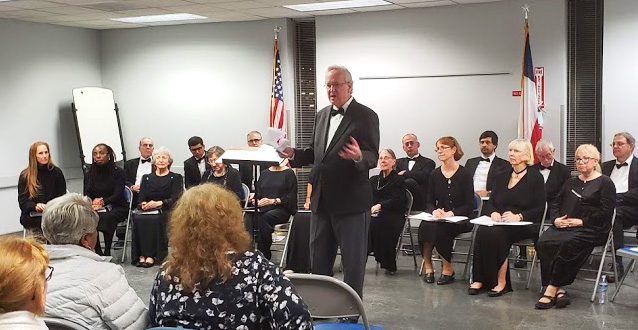
Texas Schiller Institute head Brian Lantz’s opening remarks on Dr. King.
The chorus opened the concert with a four part polyphony of the anthem “Lift Every Voice and Sing”, followed by a collage of short audio speeches by Dr. King. The program continued with four selections from the Mozart Vespers, Mozart’s “Ave Verum Corpus”, a traditional Chinese folk song, “Jasmine flower” (Mo Li Hua), and a number of spiritual selections, one of which was led by tenor Brian Lantz. Among the highlights of the evening were the solo spiritual performances of “Go Down Moses” sung by Maestro Dorceal Duckens, and “Swing Low Sweet Chariot” sung by Kesha Rogers.
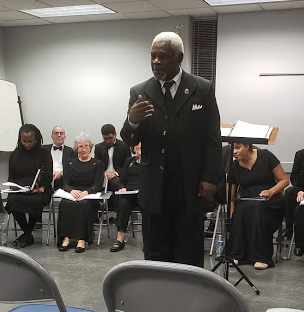
Maestro Dorceal Duckens singing ‘Go Down Moses’.
The audience was truly transformed by the power of the music and the selection of clips from Dr. King intertwined. At the end of the event the audience was asked to stand and cross arms and join in in singing “We Shall Overcome.”
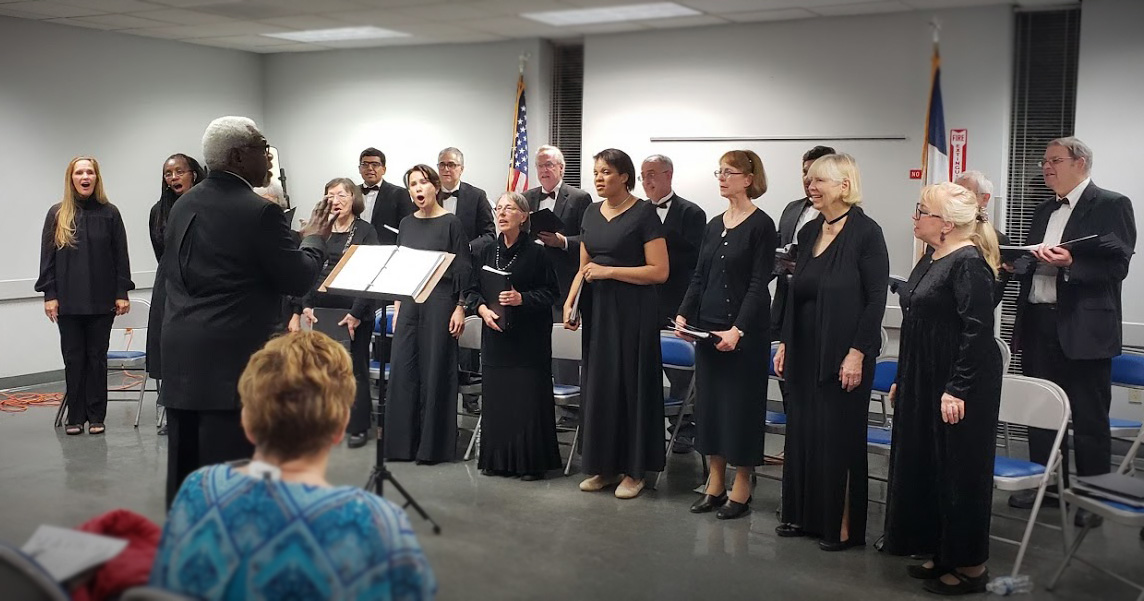
The Houston Schiller Institute Community Chorus.
Newer members to the chorus expressed how happy they were to sing with the chorus. Everyone was overjoyed by the experience and you had a sense that the concert had a transforming quality on everyone. It was not just entertainment, and no one left the room as the same person they were when they entered.
On January 1st, the Virginia Schiller Institute Community Chorus continued its tradition of ringing in the New Year with a concert of Classical music in Leesburg, VA. Megan Beets, director of the chorus, opened the concert quoting Friedrich Schiller, “Live with your century, but be not its creature; give to your contemporaries, but what they need, not what they praise…. Your own nobility will awaken theirs, and their unworthiness will not defeat your purpose.” She challenged the audience with Schiller’s maxim that a beautiful culture is not an option, but that beauty and the beautiful character is a necessary condition for mankind. She also reminded the audience of the true context in which we welcome the new year,
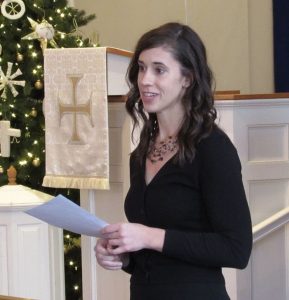
Virginia Schiller Institute Choral Director, Megan Beets
“…we are in a period of great change and transformation for all mankind. The old order of empire and war is collapsing as we speak, and new possibilities for the future of humanity are coming to the fore–for example, the fact that a little over 12 hours ago, a little space craft from planet Earth called “New Horizons” flew by and gathered data from an an object in the farthest reaches of our solar system, over 4 billion miles away. Or that in the next day or two, a little spacecraft from planet Earth called “Chang’e 4”, launched by China, will attempt the first-ever landing on the far side of the Moon.”
With this introduction, the 90+ minute program began, a lively mix of offerings by the chorus and musician friends, including vocal and instrumental soloists. The chorus performed Spirituals, two pieces from Handel’s Messiah, and two “Glorias”—one a chorale from Bach’s Wachet Auf and the other from Beethoven’s Mass in C. Other offerings included Bach solo strings—one each for violin, viola, and cello; the first movement of Dvorak’s “American” string quartet; a Mozart trio from Cosi fan tutte; a trumpet air from a Bach cantata; and vocal solos including a Schumann lied, Russian folk songs, and Burleigh’s “Honor! Honor!”
The audience, 100 people (with roughly 50 musicians on top of that) was diverse mix of teachers, musicians, students, former local politicians, friends of the church, and others who had seen the concert advertised in shops and in newspapers. Attentive and engaged throughout the entire 90+ minute event, the general response from the audience was one of awe. Many attendees, coming to hear music, were struck by the directors opening remarks and how fitting they are for today’s times. “I can’t believe what I heard and saw, this was wonderful, I could hardly keep from crying!”, reported a local businesswoman and former federal government employee who came off a weekly paper ad. “Awesome! Such diverse talents! Diverse community too!” “Wonderful way to begin the year. Thank you so much!”
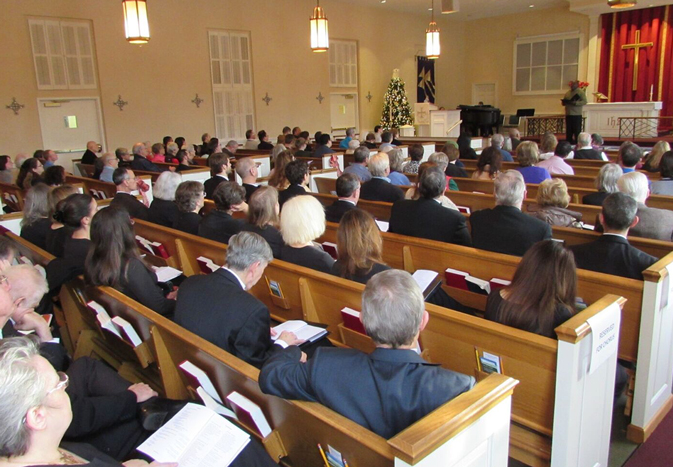
Several of the soloists who performed also reiterated their appreciation for the opportunity to work the Schiller Institute. One soloist, inspired by the Schiller Institute’s “top-down” approach to thinking about global events and culture, and moved by Michelle Fuchs’ two Russian pieces, decided she would also start working on Russian songs as a way to share their culture with Americans. Another soloist said, “I wouldn’t miss these concerts for anything, they have become very special to me.” And a third soloist, “I’ve been watching this group; the tone of it is improving every time I hear it, it’s getting pretty good.”
The reception afterwards was festive and celebratory, with audience members expressing their gratitude towards the Schiller chorus for uplifting their state of mind, and creating such a memorable cultural impact in their community.
For more information on the Virginia Schiller Institute Community Chorus, contact va.chorus@schillerinstitute.org.
On January 3rd, 2019, for the third year in a row, a memorial was held in Bayonne, New Jersey for the victims of the December 25th, 2016 plane crash which took the lives of the many members of Russia’s famous Alexandrov Ensemble, journalists, philanthropist Elizaveta Glinka, and others. This memorial, organized by the Schiller Institute, took place at the foot of the “Tear Drop Memorial,” a 100-foot statue gifted to the United States by the Russian Federation in 2005 in honor of the victims of the September 11th, 2001 terrorist attacks.
Members of the Schiller Institute and the Schiller Institute NYC Chorus, led by Diane Sare, Founder and Co-Director, were joined by the Bayonne Fire Department Honor Guard, Captain Haiber and Chief Weaver of the Bayonne Fire Department, Dmitry Chumakov, Deputy Permanent Representative of the Russian Federation, Dr. Louay Falouh, Minister Counselor of the Syrian UN Mission, Father John Fencik of Saint Mary’s Carpatho-Russian Orthodox Church, and others in the ceremony. In opening the ceremony, the Chorus sang both the Russian national anthem (in Russian) and the US national anthem. The Bayonne Fire Department Honor Guard stood at attention throughout the forty five minute ceremony.
These performances were followed by comments from Deputy Permanent Representative Chumakov, who paid tribute to the victims of the 2016 tragedy and spoke to the continuation of the efforts of both the reconstituted Alexandrov Ensemble and the Charity Foundation of Elizaveta Glinka. He concluded with significant statement of Russian policy in Syria: “Considerable progress has been made on Syria in 2018. Now we need to step up joint efforts to launch the Constitutional Committee in Geneva, that would enjoy support of the Syrian parties, in accordance with the decisions of the Syrian National Dialogue Congress in Sochi. Syria’s future must be determined by the Syrians themselves in a political process they conduct and control with international mediation. Such an approach would contribute to settling and overcoming the consequences of the war; re-establishing the country’s full sovereignty and territorial integrity.” Mr. Chumakov’s full statement is available on the Russian Federation UN Mission’s website.
Then spoke Dr. Louay Falouh, Minister Counselor of the Syrian UN Mission, who thanked the government of the Russian Federation for their work to support Syria, and expressed his deep condolences for the losses of December 25th, 2016. Chief Weaver and Captain Haiber of the Bayonne Fire Department separately gave profound remarks expressing their condolences, as well as their thanks to Russia for the comfort they personally felt when visiting the Tear Drop Memorial. Bayonne first responders received enormous numbers of people fleeing by boat from Manhattan on 9/11. Captain Haiber told the audience, “At times like this, we are neither Russian nor American—we are human.” He also spoke in Russian, expressing his wishes for peace and friendship.
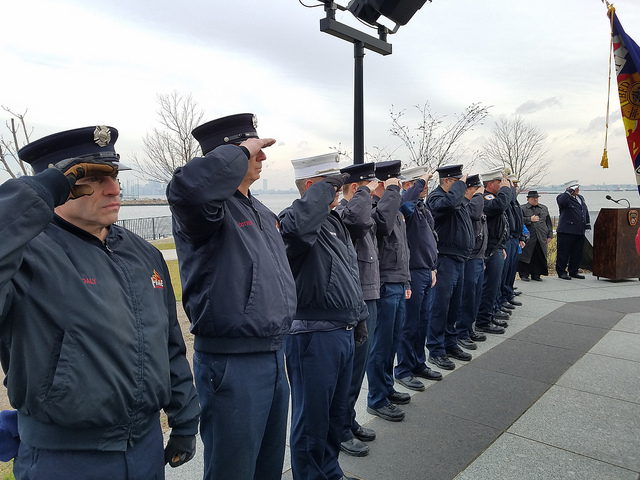
Father Fencik, whose close relative had been the translator at the famous meeting on the Elbe River between Soviet and American forces, gave an invocation saying that these dead will never be forgotten, and then gave a sung prayer in Russian.
At the conclusion, Diane Sare, Founder and Co-Director of the Schiller Institute NYC Chorus, spoke on behalf of the Schiller Institute and the Schiller Institute NYC Chorus, and read aloud the written message from Schiller Institute President Helga Zepp-LaRouche.
Two years after the tragic death of 64 members of the Alexandrov Choir Ensemble on their way to Syria on December 25th, 2016, that country is now almost entirely freed from the terror of ISIS due to the determined intervention of Russia in collaboration with the Syrian army. This liberation demonstrates what human beings can do when they unite with a good plan and for a just cause, and that, as Friedrich Schiller would say, even the most tyrannical foe can be subdued. As now there will be a more hopeful period in the history of Syria, with the economic reconstruction and the return of millions of refugees, the memory of the Alexandrov Choir Ensemble will be written into the history of Syria and should be celebrated every year with beautiful concerts in many cities, celebrating the Russian-Syrian friendship and the immortality of great art and the artists, who devote their lives to the ennoblement of mankind.
— Helga Zepp-LaRouche, Founder, Schiller Institute
Diane concluded her remarks by saying that this moment called to mind to words that Handel had immortalized the his Messiah “Death is Swallowed up in Victory.”
Each of the speakers made a special point of thanking the Schiller Institute for organizing the event. Russian news service TASS, as well as TV stations Russia 1 and RT were present.
Participation in this event had a profound effect on our activists and choir members who joined in. Patrick from Connecticut said, “I was so glad to be there and be a part of this. As I looked around and saw who was gathered here, I felt like we were on a kind of different planet from the rest of the population – and how important is that we do this.”
On November 18, 2018, the Schiller Institute NYC Chorus performed a concert at St. Bartholomew’s Church in New York City in celebration of Friedrich Schiller’s birthday. The concert included performances of Bach, Brahms, spirituals, Beethoven’s Choral Fantasia, Op. 80, and Beethoven’s Mass in C, Op. 86.
“It is my view that only if we reinstate a beautiful image of Man and celebrate this in the highest forms of Classical music, Classical poetry, beautiful painting, that we can get Mankind back its dignity. And therefore, at this joyful occasion of Schiller’s birthday, in a very tumultuous environment, and very tumultuous situation, the world is more in need of a Classical Renaissance than ever. So join the Schiller Institute, and the chorus, and let us create a better human civilization.”
Helga Zepp-LaRouche, excerpt from concert program
We hope you enjoy and are inspired to act with us by this beautiful performance.
Part One
Part Two

















